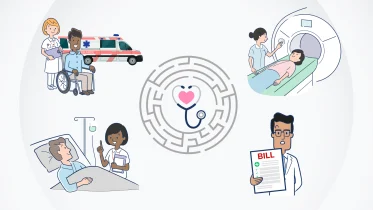Private Health Insurance For Flu Shots
It is estimated that 1 in 5 of us will suffer some symptoms this flu season.
Although not serious for most people, flu can be very debilitating.
It can have similar symptoms to the common cold, but is more intense.
Typical symptoms include fever, muscle aches and pains, headaches, dry cough, loss of appetite and severe fatigue.
It can be extremely serious for those with vulnerable health, who are at risk of complications.
If you are one of these people, free flu shots are available.
You can also choose to get flu shots even if you are not 'at risk', but must cover the cost yourself.
You may want to look at private health insurance for this as flu shots are recommended by medical professionals every year.
COMPARE & SAVEDo I need a flu shot?
Unlike colds, flu is a more serious condition and can have complications for some people.
In some cases, it can even prove fatal.
Flu shots are advised for those deemed 'at risk' of complications.
It is also recommended if you live or work with people who may be 'at risk'.
This includes:
Pregnant women
Parents and guardians of infants aged six months or less
Those with chronic conditions such as heart disease, asthma, lung conditions, cancer, diabetes, kidney disease and neurological disease
Those who are very obese
Indigenous Australians e.g. Aboriginal and Torres Strait Islanders
Frontline health workers
Community care workers
Does the flu jab mean I won't get the flu?
Flu shots do not mean that you definitely will not get the flu.
The virus does mutate so it is not a fool-proof answer.
If you do develop the flu despite having the jab, your symptoms may be less severe.
Complications are less likely too, which is why flu shots are highly recommended for people with vulnerable health.
Can I get a free flu shot?
Flu shots are free if you:
Are aged over 65
Are pregnant
Are an Indigenous Australian aged 15+
Live in a nursing home or other long-term care facility
Are aged over six months and have a chronic condition which makes you more likely to get flu
What if you already had a flu shot the previous year? Getting another each year is recommended.
You are not immune forever after one flu shot.
The flu vaccine protects against three flu strains most likely to do the rounds in the upcoming flu season.
When to get a flu shot
Australians are typically advised to get a flu shot between March and May.
This gives you a chance to build immunity before flu season begins.
You will be protected from around two weeks later for up to a year.
Other options for flu shots
What if you are not eligible for the free flu jab? You can still get the jab, but you will have to pay.
See your doctor if you are worried about getting the flu.
He or she can write you a prescription, which you can take to the pharmacy to collect the vaccine.
Does health insurance cover flu shots?
You may be able to get it as a non-PBS prescription through private health insurance.
Don't forget to compare health funds, as the annual limits for non-PBS drugs will vary.
Treating flu
Antiviral drugs may be given early on but these are not a cure.
They can lessen symptoms and encourage quicker recovery, but not by much.
Contrary to popular opinion, antibiotics will not be useful.
Treatment for flu usually involves:
Bed rest until the fever goes away
Drinking plenty of fluids
Keeping an eye out for breathing problems, green-yellow phlegm and severe headaches. These can be signs of pneumonia and other complications.
This article is opinion only and should not be taken as medical or financial advice. Check with a financial professional before making any decisions.





